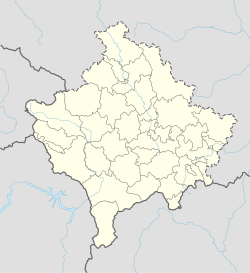This article needs additional citations for verification. (September 2014) |
Hajvalia (Albanian: Hajvalia, Serbian Cyrillic: Ајвалија) is a village in the municipality of Pristina, Kosovo. It has approximately 2,300 houses and 7,391 (2011) inhabitants. A small creek begins in the town, while another begins north-east of the town and runs through it. After 1970, right up until now, there has been an increase in population, mainly from newcomers.
Hajvalia
| |
|---|---|
| Coordinates: 42°37′N 21°11′E / 42.617°N 21.183°E | |
| Country | |
| District | Pristina |
| Municipality | Pristina |
| Elevation | 635 m (2,083 ft) |
| Population (2011) | |
• Total | 7,391 |
| Time zone | UTC+1 (CET) |
| • Summer (DST) | UTC+2 (CEST) |
| Postal code | 10000 |
| Area code | 0381 (0)38 |
The road here passes through Gjilan and Prishtinë and connects with M25.2 way.
Demographics
edit| Year | 1948 | 1953 | 1961 | 1971 | 1981 | 1991 | 2011 |
|---|---|---|---|---|---|---|---|
| Population | 436 | 757 | 1192 | 1696 | 3027 | 3962 | 7391 |
Places of interest
editThere is a zinc and silver mine, which opened in 1953 and have been completely renovated, namely the Trepča Mines-Pristina (Hajvalia). A public park is located near the town-centre, along the Dëshmorët e Gollakut (Lit. Gollak Martyrs road). There is a mosque, Xhamia e Hajvalisë (Lit. Mosque of Hajvalia), in the south-west of the village.
Sport
editThe local football club was KF Hajvalia.
Education
editThere are two primary schools in Hajvalia. The most recent, "Afrim Gashi", was opened roughly 11 years ago, named after the martyr who was an inhabitant of Hajvalia. The other primary school is "Shkëndija" (Lit. "Spark").
Other
editBehgjet Pacolli AKR chairman and former president of Kosovo is a resident. In Hajvalija there is the International Village. After the war it saw development of small businesses and private businesses.
A Swedish KFOR military camp, Camp Victoria, was located in Hajvalia.[1] Most of the Swedish soldiers in the Kosovo Force in Kosovo were located at Camp Victoria. The camp was previously named Camp Gripen, but the name was changed in spring 2000. It was named for Victoria, Crown Princess of Sweden.[2]
Most of the soldiers were Swedish, but there were also Irish, Czech, Finnish and Latvian soldiers. In June 2004, the total number of personnel was about 450 persons, out of which 329 came from Sweden,[3] while the camp housed 700 soldiers in 2002.[4]
Most of the soldiers belonged to the Swedish mechanized rifle company and the Swedish supply company. In June 2011, Camp Victoria was to be completely discontinued and KS21 was the last Swedish contingent that was operational at the camp[5] before KS22 moved into the KFOR headquarters at Camp Film City.[6][7]
References
edit- ^ Eriksson, Charlotta (22 November 2003). "Vart är Kosovo på väg?". Hallands Nyheter (in Swedish).
- ^ Sjöström, Hannah (28 August 2002). "Prinsessa på farligt uppdrag". Expressen (in Swedish).
- ^ Söderlund, Peter (24 June 2004). "Svettigt hjälparbete". Södra Dalarnes Tidning (in Swedish).
- ^ Kronqvist, Patrik (21 May 2002). "Som en normal svensk småstad". Värnpliktsnytt (in Swedish).
- ^ "Kristina med i Kosovo". Karlskoga Tidning (in Swedish). 10 June 2010. p. 6.
- ^ "Nya boendelösningar när Camp Victoria läggs ner" [New housing solutions when Camp Victoria is closed down] (in Swedish). forsvarsmakten.se. 8 June 2010. Archived from the original on 2014-10-29. Retrieved 6 March 2013.
In June 2011, Camp Victoria was to be completely discontinued.
- ^ "Swedish Soldiers Receive Well-Earned Accolades". KFOR: KFOR Chronicle. NATO. 1 April 2005. Retrieved 2023-05-29.
